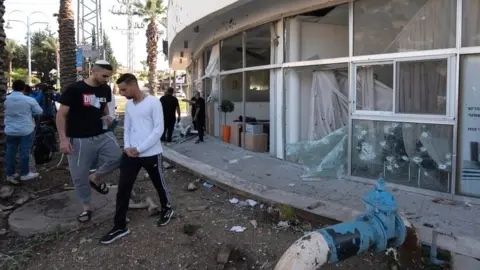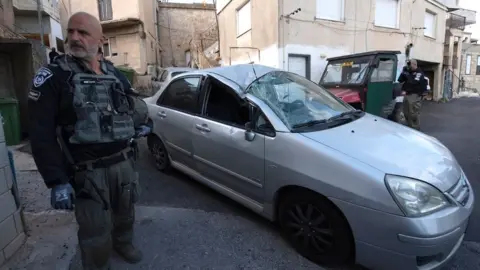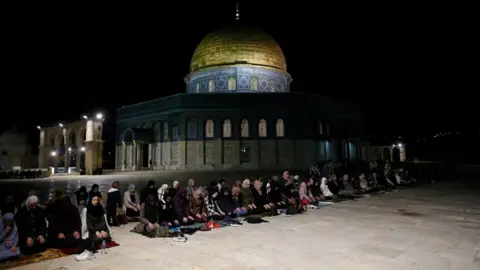Israel blames Hamas for Lebanon rocket barrage as tensions rise
 Reuters
ReutersThe Israeli military has accused the Palestinian militant group Hamas of firing dozens of rockets from southern Lebanon into northern Israel.
It said most of the 34 rockets were intercepted but that five hit Israeli territory, causing damage to buildings.
One man was lightly wounded by shrapnel, according to medics.
Hamas said it had no information about who fired the missiles. The attack was the biggest single barrage from Lebanon in 17 years.
It comes at a time of rising tensions. There has been outrage in the region at the actions of the Israeli police, who have raided the al-Aqsa mosque in Jerusalem - Islam's third holiest site - for the past two nights, triggering violent confrontations with Palestinians inside.
Palestinian militants in the Gaza Strip, which is controlled by Hamas, have also fired 25 rockets at Israel over the same period, and the Israeli military has carried out air strikes there in response.
Late on Thursday, the Israel Defense Forces (IDF) said they were "currently striking in Gaza". A number of explosions were heard in Gaza, and AFP news agency reported that multiple Hamas training sites had been hit.
Earlier on Thursday, air raid sirens sounded in communities across northern Israel after rockets were launched from Lebanon while Israelis celebrated the Jewish festival of Passover.
The Israeli military did not say where the five rockets that struck Israeli territory landed. But photographs showing damage to several buildings in the border town of Shlomi, including a bank, and a car in the village of Fassuta.
"We heard booms, and sirens. A rocket hit the roof of a car as it was passing my house, but the rocket didn't explode. When I went after the car, I saw someone was injured," one eyewitness said.
 EPA
EPAIsrael's Magen David Adom ambulance service treated a man with shrapnel injuries, a woman who was injured while running to a shelter, and another woman who had stress symptoms.
Israeli military spokesman Lt Col Richard Hecht said they believed Hamas was behind the attack and that it was possible the militant group Islamic Jihad was also involved.
He added that they assumed the Lebanese militant group Hezbollah, which fought a month-long war with Israeli in 2006, knew about the attack, and that they suspected there was Iranian involvement.
Hamas has confirmed to the BBC that the attacks came during a visit to Beirut by its leader, Ismail Haniyeh.
But a Hamas official told the BBC the visit was prepared in advance and had nothing to do with recent developments. It said it did not have any information about who fired the missiles.
Mr Haniyeh was later quoted by AFP news agency as saying that "our Palestinian people and the Palestinian resistance groups will not sit idly by" in the face of Israel's "savage aggression" against the al-Aqsa mosque.
Israeli Prime Minister Benjamin Netanyahu convened his security cabinet late on Thursday to discuss the situation.
In a televised address, he said: "We will hit our enemies and they will pay a price for all acts of aggression."
Mr Netanyahu also called for a calming of tensions, adding "we will act decisively against extremists who use violence."
Lebanese Prime Minister Najib Mikati condemned any military operations from the country's territory that "destabilise the situation".
The United Nations peacekeeping force in Lebanon, Unifil, said the situation was "extremely serious" and urged "restraint and to avoid further escalation".
Hezbollah, which controls much of southern Lebanon, had vowed hours before the rocket launches to support "all measures" taken by the Palestinian people "to protect worshippers and the al-Aqsa mosque and to deter the enemy from continuing its attacks".
 Reuters
ReutersThe mosque is located on a hilltop complex in occupied East Jerusalem known by Muslims as al-Haram al-Sharif (the Noble Sanctuary) and by Jews as the Temple Mount. Jews revere it as the location of two Biblical temples and it is the holiest site in Judaism.
Video footage appeared to show Israeli police entering the mosque on Wednesday night, while being pelted with objects from inside.
A police statement said that "dozens of law-breaking juveniles, some of them masked, threw fireworks and stones" into the mosque "with the aim of disrupting the order" as worshippers gathered for nightly Ramadan prayers.
"At some point the violent rioters tried again to close the mosque doors and prevent the worshipers from leaving the mosque in order to barricade themselves in the place," it added. "Police forces prevented the lawbreakers from closing the doors and helped the worshipers leave."
The official Palestinian news agency, Wafa, reported that the officers "assaulted Palestinian worshippers, beating them with clubs and targeting them with concussion grenades, tear-gas canisters and rubber-coated steel bullets as a means to forcefully expel them".
The Palestinian Red Crescent said six people were injured.
The Israeli military meanwhile said that seven rockets were launched from Gaza early on Thursday morning and that all of them exploded in the air. Another two were fired on Wednesday evening, with one falling within the Strip and a second landing in an open area near the Gaza border fence.
On Tuesday night, more than 350 Palestinians were arrested and 50 were hurt during a similar raid at the al-Aqsa mosque, while militants in Gaza fired 16 rockets into Israel and the Israeli military carried out air strikes on militant sites belonging to Hamas in response.
